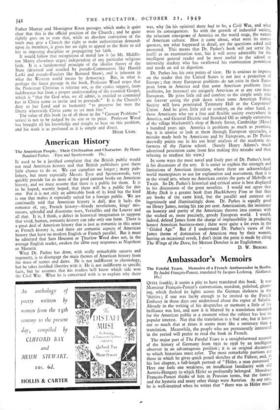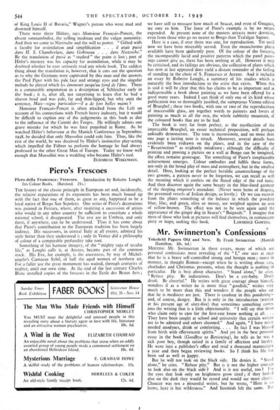Ambassador's Memoirs
QUITE frankly, it seems a pity to have translated this book. It was Monsieur Francois-Poncet's conversation, mordant, polished, gleam- ing, which flashed its lights across the German darkness in the 'thirties ; if one was lucky enough to be invited to the French Embassy in those days one understood about the rapier of Saladin. Already in the writing of his despatches or memoirs a little of his brilliance was lost, and now it is blurred by a translation intended for the American public at a moment when the subject has lost its popular interest. Not that the translation is a bad one, but it leaves out so much that at times it seems more like a summary than a translation. Meanwhile, the people who are permanently interested in the period will prefer to read the book in French.
The major part of The Fateful Years is a straightforward account of the history of Germany from 1931 to 1938 by an intelligent observer in an advantageous position ; it is an original document to which historians must .refer. The most remarkable portions are those in which he gives quick pencil sketches of the Fiihrer, and, it,! his last chapter, a full-length portrait of "Hitler, a man possessed. Here one feels one weakness, an insufficient familiarity with ohs! Austria-Hungary to which Hitler so profoundly belonged. Monsieur Francois-Poncet thinks of him in Prussian terms, but the fantasy and the hysteria and many other things were Austrian. At any rate, he is well-inspired when he writes that "there was in Hitler much of King Louis It of Bavaria," Wagner's patron who went mad and drowned himself.
There were three Hitlers, says Monsieur Francois-Ponca, the absent somnambulist, the yelling madman and the vulgar nonentity. And then we come to Nietzsche and the will to power. "Gifted with a faculty for assimilation and simplification . . . ii avait puise dans H. S. Chamberlain, dans Gobineau . . . dans Nietzsche." By the translation of pulse as " studied " the point is lost ; part of Hitler's mystery was his capacity for assimilation, while it may be doubted whether he ever seriously read any whole book. The saddest thing about the translation is, however, that it cuts out the question as to why the Germans were captivated by this man and the answer, the Pied Piper with his pale face and strange eyes and the singular melody he played which les jmouvait jusqu'au fond de I'dme. There is a comparable amputation in a description of Schleicher early in the book ; it is, after all, not surprising to learn that he had a shaven head and was pale, fat and thin-lipped, but why omit the sentence, Mais—signe particulier--(1 a de fort belles mains?
Monsieur Francois-Poncet is often attacked from the Left on account of his connections with French heavy industry, but it would be difficult to explain any of the judgements in this book as due to the influence of the Comite des Forges. He willingly admits one grave mistake for which he was later punished in Rome. As he watched Hitler's behaviour at the Munich Conference in September, 1938, he decided that only Mussolini could rule him. Thus, like the rest of the world, he was deceived by Hitler's instinctive play-acting which impelled the Fiihrer to perform the homage he had always professed to the other Great Man of Europe. Today we know well enough that Mussolini was a weakling who became Hitler's tool.
ELIZABETH WISKEMANN.



































 Previous page
Previous page